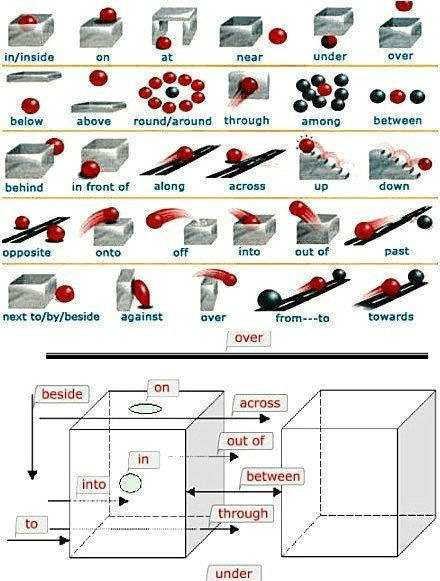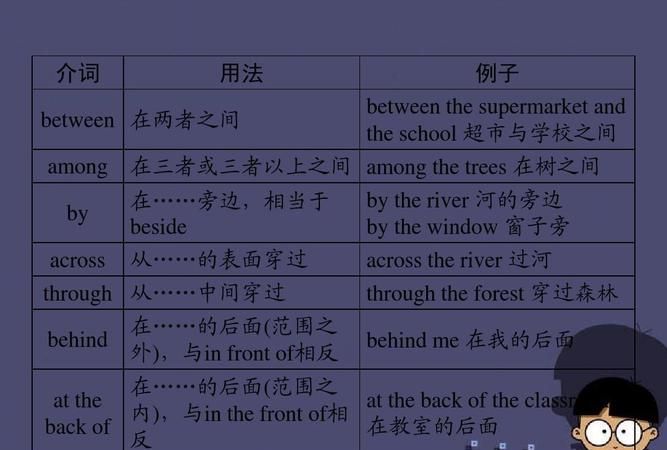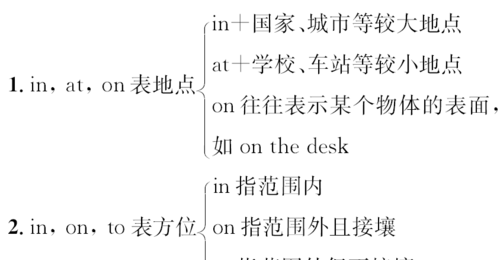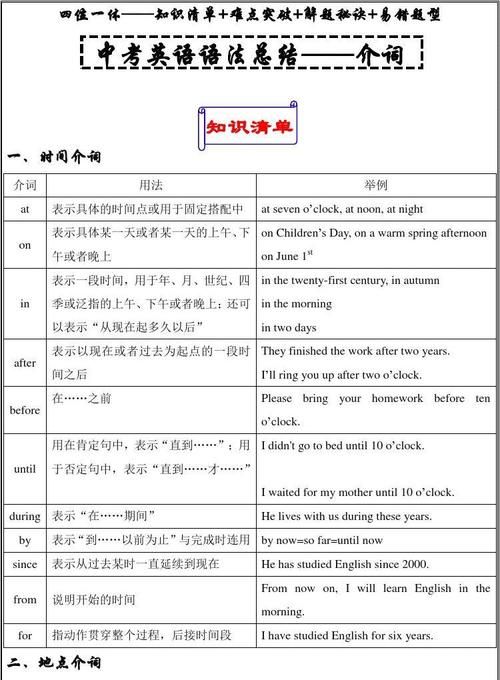本文目录
初中英语方位介词有哪些
⑴ 时间或地点介词in、on、at的用法区别:表示时间时, in表示在一段时间里(在将来时句子中则表示在一段时间之后), on表示在具体的某一天或者某天的上下午等, at表示在某个时刻或者瞬间;表示地点时, in表示在某个范围之内, on表示在某个平面上或与一个面相接触,at则表示在某个具体的场所或地点。如:He was born on the morning of May 10th.(他出生于五月十日的早晨)/ I usually get up at 7:00 in the morning.(我通常在早上的七点钟起床) / His glasses are right on his nose.(他的眼镜就架在他的鼻子上)/ He is at the cinema at the moment.(此刻他正在电影院)
⑵ after与in表示时间的用法区别:“after+(具体时刻/从句)”表示“在…时刻之后”常用于一般时态;“in+(一段时间)”表示“在(多久) 之后”,常用于将来时态。如:He said that he would be here after 6:00.(他说他六点钟之后会来这儿)/ My father is coming back from England in about a month.(我父亲大约一个月以后从英国回来)
⑶ since与for表示时间的用法区别:“since+(具体时刻/that-从句)”表示“自从…起一直到现在”,“for +(一段斶间)”表示“总共有…之久”,都常用于完成时态;如:Uncle Li has worked in this factory since 1970.(李叔叔自从1970年起就在这家工厂工作了)/ Uncle Li has worked in this factory for over 30 years. (李叔叔在这家工厂已经工作了30多年)
⑷ by、in与with表示方式的用法区别:都可以表示“工具、手段”,但是by主要表示“乘坐”某个交通工具或“以……方式”,在被动句中可以表示动作的执行者;in表示“使用”某种语言/文字,with表示“使用”某个具体的工具、手段。如:We see with our eyes and walk with our feet.(我们用眼睛看东西,用双脚走路)/ Please write that article(文章) in English.(请你用英语写那篇文章)/ Let’s go to the zoo by taxi.(我们打的去动物园吧。)/ It was written by Lao She.(那是老舍写的)
⑸ about与on的用法区别:都可以表示“有关…”,但是about的意义比较广,而on主要表示“有关…(专题/课程)”。如:Tom is going to give a talk on the history of America.(汤姆要作一个美国历史的报告)/ They are very excited talking about the coming field trip.(他们兴致勃勃地谈论着即将来到的野外旅游)
⑹ through与across、over的用法区别: through指“穿过…(门洞/人群/树林)”; across和over可以指“跨越…(街道/河流)”,可互换,但是表示“翻过…”时只能用over. 如:Just then a rat (鼠)ran across the road.(就在那时一只老鼠跑过路面)/ There is a bridge across/over the river.(河上有座桥)/ They climbed over the mountain and arrived there ahead of time.(他们翻过大山提前到达了那里)/ The visitors went through a big gate into another park.(参观者们穿过一个大门来到另一个公园)
(7)as与like的区别:两个词都表示“像……”,但是as译为“作为……”,表示的是职业、职务、作用等事实,而like译为“像……一样 ”,表示外表,不是事实。如:Let me speak to you as a father.(我以父亲的身份和你讲话。)(说话者是听者的父亲) / Let me speak to you like a father.(让我像一位父亲一样和你讲话)(说话者不是听者的父亲)
(8)at the end of、by the end of、to the end、in the end的用法区别:at the end of…既可以表示时间也可以表示地点,译为“在…末;在…尽头”,常与过去时连用;by the end of…只能表示时间,译为“在…前;到…为止”,常用于过去完成时; in the end与at last基本等义,表示“终于、最后”,通常用于过去时;to the end译为“到…的终点为止”,前面往往有表示运动或连续性的动词。如:By the end of last term we had learned 16 units of Book III.(到上学期期末我们已经学习了第三册16个单元)/ At the end of the road you can find a big white house with brown windows.(在路的尽头你能找到一幢有棕色窗户的白房子)/ They left for Beijing at the end of last week.(上周末他们动身去了北京)/ In the end he succeeded in the final exams.(他最终在期末考试中考及格了)/ We should go on with the work to the end.(我们应该把工作干到底)/ Follow this road to the end and you will see a post office.(沿这条路走到底就能看见一家邮电局)
(9)for a moment、for the moment、in a moment、at the moment的区别:for a moment“一会儿、片刻”(=for a while),常与持续性动词连用;for the moment“暂时、目前”,常用于现在时;in a moment“一会儿、立即、马上”(=soon; in a few minutes),一般用于将来时;at the moment“此刻,眼下”(=now),用于现在进行时。如:Please wait for a moment.(请稍等)/ Let’s leave things as they are for the moment.(暂时就维持现状吧!) / I’ll come back in a moment.(我过会儿回来)/ I am very busy at the moment.(眼下我很忙)
(10)but的问题:用介词but引出另一个动词时,要注意:如果前面有do,后面就用原形动词,前面没有do时,后面的动词要加to。如:I could do nothing but wait.(我什么也做不了只能等) / They had no choice(选择) but to fight.(他们没有选择只有战斗)
(11)in front of 与in the front of: in front of“在…的前面”, 与in the front of“在…的前部”。如:A car was parking in front of the hall.(大厅跟前停着一辆汽车)/ In the front of the hall stood a big desk.(大厅前部立着一个大讲台)
(12)except (for)与besides的区别:except“除了”,表示排除掉某人物,即不包含;而besides“除了”则表示包含,即“不仅……又……”。如:Everyone went to the Palace Museum except Tom.(除了Tom,大家都去了故宫博物院)(Tom没有去故宫)/ Besides Chinese he also studied many other subjects.(除了汉语之外,他还学其他许多功课)(“汉语”也是他学的功课之一)
other than 除了......之外...... There 're nobody here other than me 与.....不同..... 与.....不同方式.....we can't get there other than by swimming.
Apart from : with the exception of ...; besides... Apart form a few scratches, the car was undamaged.

初中英语介词短语归纳
重点推荐:初中英语常用介词短语
1)at once 立刻
2)at last 最后
3)at first 起先,首先
4)at the age of… 在……岁时
5)at the end of… 在……之末
6)at the beginning of… 在……之初
7)at the foot of… 在……脚下
8)at the same time 同时
9)at night/noon 在夜里/中午
10)with one's help 在某人的帮助下,由于某人的帮助
11)with the help of … 在……的帮助下
12)with a smile 面带笑容
13)with one's own eyes 亲眼看见
14)after a while 过了一会儿
15)from now on 从现在起
16)from then on 从那时起
17)far example 例如
18)far away from 远离
19)from morning till night 从早到晚
20)by and by 不久
21)by air mail 寄航空邮件
22)by bike/air/train/bus 骑自行车/乘飞机/火车/汽车
23)by ordinary mail 寄平信
24)by the way 顺便说
25)by the window 在窗边
26)by the end of… 到……底为止
27)little by little 逐渐地
28)in all 总共
29)in fact 事实上
30)in one's twenties 在某人二十几岁时
31)in a hurry 匆忙
32)in the middle of 在……中间
33)in no time (in a minute) 立刻,很快
34)in time (on time) 及时
35)in public 公众,公开地
36)in order to 为了……
37)in front of 在……前面
38)in the sun 在阳光下
39)in the end 最后,终于
40)in surprise 惊奇地
41)in turn 依次
42)of course 当然
43)a bit (of) 有一点儿
44)a lot of 许多
45)a little 一点儿
46)on one's way to 某人在去……的路上
47)on foot 步行,走路
48)a talk on space 一个关于太空的报告
49)on the other hand 另一方面
50)at/on the weekend 在周末
51)on the left (right) 在左(右)边
52)on the other side of 在……另一边
53)on the radio 通过收音机(无线电广播)
54)to one's joy 使……高兴的是
55)to one's surprise 使……惊讶的是
另外有一个做了分类汇总的帖子
初中课本中常见介词短语分类列举
初中课本中常见介词短语分类列举
1.表示时间的介词及介词短语�
in, at, on, before,after,till,since,for, fromto, until, by,in the middle of,at the beginning of, at the end of,at half past five,at night,in a week,in the morning,in class,at sunrise, in spring/summer/autumn/winter,on Sunday,on Saturday afternoon,on a winter evening,for a long time,for two months,after school,since liberation,before lunch,at the time of,at the age of。
2.表示地点的介词及介词短语�
in,at,into,to,on,beside,before,behind,above,under,outside,inside,up,from,far,from,near,across, off, down, among, past,between,out of,around,in the front of, in the middle of, at the back of,at the foot of,at home,at the gate,at the table,in the sky, on the ground,in a tree, in the south,in the sun,in the bed,on one’s way home,by the side of。�
3.介词和各类词搭配构成的介词短语�
1).介词与动词搭配�
arrive in/at到达 ask for要,请求�do well in在……方面做得好�give in投降go on继续�
hear from收到……来信 hear of听说�help's B.with sth.帮助……做�
laugh at嘲笑 learn from向……学习�leave for离开一地去另一地�
talk to与……谈话 go in for从事,致力于�
put up穿上,挂上 take down拿下,取了�look at(有意识地)看 speak to对某人说�
send for派人去请�shout at大声叫喊,吼叫�take away拿走,带走think of考虑,关心�
turninto把……变成 wait for等候,等待�take off脱下,起飞�
turn on/off打开(关上)�listen to听 look after照顾,照看�
look for寻找 look like 看上去像�get to 到达 point to 指着……�
fill with充满,装满 begin with以……开始�deal/do with处置,对待�
meet with偶尔遇见,遭遇� pass on传递
belong to属于�write to写信给……�call on号召,访问,邀请�die of死于……
depend on依靠,依赖�smile at向……微笑 believe in信任�look out向四下看,到处看�
2).介词与名词搭配�
in time及时 in bed卧床�in life一生中 on time准时,按时�
in front of在……前面 on foot步行�by bus乘公共汽车 at home在家�in English用英语 in the middle在中间�
at night在晚上 at noon在中午�at hospital在医院 with a smile带着微笑�
of course当然(可以) in a hurry匆忙,急忙�in a minute一会儿�by the way顺便说说/问问�
at first首先,起初 at last最后,终于�at the meeting在会上 at least至少�on one’s way to在……的路上�
in the sun在阳光下in a tree在树上�in surprise惊奇地 at once立刻,马上�at the foot of在……脚下
at all压根儿�at dinner在吃正餐 at the table在桌子旁�at work在工作
at school在学校�at the back of在……后面�
at the beginning of在……开始 at the end of在……结尾�at the same time同时,然而�by hand用手,手工,亲手�
by the end of到……结束时�by train乘火车day by day日复一日�one by one一个接一个�
by spaceship乘坐宇宙飞船�in a low voice大声地�in a word总而言之,一句话�in trouble处于困境
in fact事实上�in the street在街上in the end最后,终于�in space在空间
in no time立刻,很快�in order按顺序,整齐,正常�in order to为了,以便 in the day在白天�
in line成一直线in a short while不久�in all总共,总计 in town在城里�in silence不作声�
out of breath上气不接下气�out of sight消失,看不见�on duty值日�on the left/right在左/右边�
on the one handon the other hand一方面……另一方面�on the other side of在……的另一边�
on top of在……顶上 in the distance在远处�in public当众,公开地 out of work失业�
on the radio通过无线电广播 �to this day直到今天�to one’s surprise/joy使某人吃惊/高兴�
3)介词与形容词、过去分词和动词等搭配�
be born in出生于……be good at擅长……�be made of由……制成�
be angry with s B. 对某人生气�be angry at sth. 为某事生气�be pleased with s B. 对某人感到满意�
be satisfied with sth.对某事感到满意�be surprised at对……感到惊奇/诧异�be tired of讨厌……/厌倦……�
be interested in对……感兴趣�be proud of以……为自豪/骄傲�be full of充满……
take/catch hold of抓住�be sure of确信…… take part in参加�
break into 闯入�take care of照顾,关心,保管�
be busy with忙于……�be strict with对……严格要求�
catch up with跟上,赶上� have nothing to do with与……无关�
go to school上学 go to bed/sleep睡觉�give a lesson to给……上课�
go to the cinema 去看电影�be kind to s B.对某人友好�say hello to向……问好�look forward to盼望,期待�
keep out of不让进入 go on strike罢工�be used to习惯于……�
4.看似相同,但意义有别的词组�
英语中有一些介词词组和动词词组,它们从形式上看似乎基本相同,但在意义上却截然不同。要是我们在记忆上对这类词组不加以重视,使用时就很容易望文生义,甚至张冠李戴。为此,把这类词组归纳如下:�
1).介词词组�
(1) at table在进餐�at the table在桌子旁(=beside the desk) �
(2) at desk在读书或做作业�at the desk在书桌旁 �
(3) at school在校上学(指学生)�at the school在学校(指教职工) �
(4) in front of the bus在公共汽车的前面(不在车上)�in the front of the bus在公共汽车的前部(在车上) �
(5) at sea在航海中�at the sea在海边 �
(6) by day白天�by the day按日,论日 �
(7) behind time误期�behind the time落后于时代 �
(8) in class在上课,在课内�in the class在这个班 �
(9) in bed 卧床,在睡觉�in the bed在床上 �
(10) in prison坐牢�in the prison在监狱 �
(11) in red穿着红色的衣服�in the red负债,亏损 �
(12) in hospital住院(指病人)�in the hospital(因事)在医院 �
(13) in office在办公,执政�in the office在办公室 �
(14) in secret秘密,私下�in the secret参入秘密,参入阴谋 �
(15) in place of 代替,而不是�in the place of在……地方 �
(16) in case of万一,如果�in the case of就……来说,至于 �
(17) of age成年人�of an age同龄人 �
(18) out of office离职�out of the office离开办公室 �
(19) out of prison(因犯罪)出狱�out of the prison(因事)从监狱出来 �
(20) out of question毫无疑问�out of the question不可能,办不到 �
2).含有介词的动词词组�
(1) come out of hospital(病好)出院�come out of the hospital(因事)从医院里出来 �
(2) come out of prison(刑满)释放�come out of the prison(因事)从监狱里出来 �
(3) go to school去上学�go to the school(因事)去学校 �
(4) go to college上大学�go to the/a college去一所学校(办事) �
(5) go to bed上床睡觉�go to the bed去床边 �
(6) go to hospital去住院�go to the hospital(因事)去医院 �
(7) go to prison去坐牢�go to the prison(因事)去监狱 �
(8) go to sea当海员�go to the sea去海边 �
(9) go to court起诉�go to the court(因事)去法庭 �
(10) go to church做礼拜�go to the church(因事)去教堂 �
(11) keep house管理家务�keep the house守在家里 �
(12) take place发生�take the place代替 �
3).有无冠词,意义无多大区别的介词词组�
(1)at(the)most至多�
(2)at(the)first起初�
(3)all(the)day 整天�
(4)catch(a)cold感冒�
(5)in(the)future 将来�
(6)in(the)memory of纪念�
(7)go to(the)office 上班,去办公室�
(8)go to(the)market 赶集,去市场�
(9)on(a)holiday 在度假�
(10)(the)day before yesterday 前天�
(11)(the)most of 大多数�
(12)with(a)smiling face 面带微笑�
参见***:8000/student/liuxuemin/bbs/viewthread.php?tid=53

考研英语常用介词短语
楼主,您好由动词开头构成的短语、词组很多。复习时应分类处理:
一、动词+介词
1.look at…看…,look like … 看上去像……,
look after …照料…
2.listen to…听……
3.welcome to…欢迎到……
4.say hello to …向……问好
5.speak to…对……说话
此类短语相当于及物动词,其后必须带宾语,但宾语无论是名词还是代词,都要放在介词之后。如:
This is my new bike. Please look it after.(×)
This is my new bike. Please look after it.(√)
二、动词+副词
“动词+副词”所构成的短语义分为两类:
A.动词(vt.)+副词
1.put on 穿上 2.take off脱下 3.write down记下
此类短语可以带宾语,宾语若是名词,放在副词前后皆可;宾语若是人称代词,只能放在副词的前面。试比较:
First listen to the tape, then write down the answer/write the answer down. (√)
First listen to the answer, then write down it.(×)
First listen to the answer, then write it down.(√)
B.动词(vi)+副词。
1.come on赶快 2.get up起床 3.go home回家 4.come in进来 5.sit down坐下 6.stand up起立
此类短语属于不及物动词,不可以带宾语。
三、其它类动词词组
1.close the door 2.1ook the same 3.go to work/class 4.be ill 5.have a look/seat 6.have supper 7.1ook young 8.go shopping 9.watch TV/games 10. play games
介词短语聚焦
“介词+名词/代词”所构成的短语称为介词短语。现将Unitsl-16常用的介词短语按用法进行归类。
1.in+语言/颜色/衣帽等,表示使用某种语言或穿着……。如:in English,in the hat
2.in + Row/ Team/ Class/ Grade等,表示“在……排/队/班级/年级”等。
3.in the morning/ afternoon/ evening/ 表示“在上午/下午/傍晚”等一段时间。
4.in the desk/ pencil-box/bedroom 等表示“在书桌/铅笔盒/卧室里”。
5.in the tree表示“在树上 (非树本身所有)”;on the tree表示“在树上(为树本身所有)”。如:There are some in the tree. There are many apples on the trees.
6.in the wall表示“在墙上(凹陷进去)”;on the wall表示“在墙上(指墙的表面)”。如:There’re four windows in the wall, and there is a map on the back wall.
7.at work(在工作)/at school(上学)/at home(在家)应注意此类短语中无the。
8.at + 时刻表示钟点。如:at six, at half , past ten.
9.like this/that表示方式,意为“像……这/那样”。
10.of短语表示所属关系。如:a picture of a classroom, a map of China.
11.behind/ beside/ near/ under+ 名词等,表示方位、处所。如:beside/ near the door, under/ behind the tree.
12.from与to多表示方向,前者意为“从……”,后者意为“到……”。如:from one to ten, (go) to school/ bed/ work.
另外,以下这些短语也必须掌握。如:on duty, after breakfast, at night, at the door, in the middle, in the sky, on one’s bike等。
重点句型大回放
1.I think…意为“我认为……”,是对某人或某事的看法或态度的一种句型。其否定式常用I don’t think…,如:I think he’s Mr Zhinag. (L17)I don’t think you are right.
2.give sth. to sb./ give sb. sth. 意为“把……给……”,动词give之后可接双宾语,可用这两种句型;若指物的宾语是人称代词时,则只能用give it/ them to sb. 如:
His parents give him a nice purse./His parents give a nice purse to him. Give it to Mr Hu.(L57)
3.take sb./ sth. to…意为“把……(送)带到……”,后常接地点,也可接人。如:
Please take the new books to the classroom.
4.One…, the other…/One is…and one is…意为“一个是……;另一个是……”,必须是两者中。如:One is red and one is grey.(L50)或 One is red,, the other is grey.
5.Let sb. do sth. 意为“让某人做某事”,人后应用不带to的动词不定式,其否定式为Don’t let sb,do sth.,或Let sb. not do sth. 另外,Let’s 与Let us的含义不完全相同,前者包括听者在内,后者不包括听者在内,如:Let’s go for a walk./Let us try once more, please.
6.help sb. (to) do sth./help sb. with sth.意为“帮助某人做某事”,前者用不定式作宾补,后者用介词短语作宾补,二者可以互换。如:Let me help you find it.(L42)/Let me help you with it.
7.What about…?/How about…?意为“……怎么样?”是用来询问或征求对方的观点、意见、看法等。about为介词,其后须接名词、代词或V-ing等形式。如:What/How playing chess?
8.It’s time to do…/ It’s time for sth. 意为“该做……的时间了”,其中to后须接原形动词,for后可接名词或V-ing形式。如:It’s time to have supper. =It’s time for supper.
9.like to do sth./like doing sth.意为“喜欢做某事”,如:Li Lei and his friends like to play in the tree house. (L 43)前一种句型侧重具体的一次性的动作;后一种句型侧重习惯性的动作,试比较:
Tom likes swimming, but doesn’t like to swim this afternoon.
10.ask sb.(not) to do sth. 意为“让某人(不要)做某事”,其中ask sb.后应接动词不定式,如:
Ask your friends to guess what is in it. (L44)
11.show sb. sth. / show sth. to do. 意为“把某物给某人看”,该句型的用法同前面第2点。如:
Show your friend your family photo.(L36)/Show your family photo to your friend.
12.introduce sb. to sb. 意为“把某人介绍给另一人”;introduce to sb.则是“向某人作介绍”。如:Introduce your family to her.
重点短语快速复习
1.kinds of 各种各样的
2. either…or…或者…或者…,不是…就是…
3. neither…nor…既不……也不……
4. Chinese tea without, anything in it 中国清茶
5. take a seat 就坐
6. home cooking 家常做法
7. be famous for 因……而著名
8. on ones way to在……途中
9. be sick/ill in hospital生病住院
10. at the end of在……的尽头,在……的末尾
11. wait for 等待
12. in time 及时
13. make one’s way to…往……(艰难地)走去
14. just then 正在那时
15. first of all 首先,第一
16. go wrong 走错路
17. be/get lost 迷路
18. make a noise 吵闹,喧哗
19. get on 上车
20. get off 下车
21. stand in line 站队
22. waiting room 候诊室,候车室
23. at the head of……在……的前头
24. laugh at 嘲笑
25. throw about 乱丢,抛散
26. in fact 实际上
27. at midnight 在半夜
28. have a good time=enjoy oneself玩得愉快
29. quarrel with sb. 和?/ca>
A
ask sb about doing sth
ask sb to do sth 要求某人做某事
agree to do sth 同意做某事
allow sb to do sth 允许某人做某事
ask sb. to do sth.要求某人做某事
(sb.)be allowed to do sth (某人)被允许做某事
B
be interested in doing sth 乐忠于做某事
be afraid to do sth 害怕做某事
be afraid of doing sth. = be afraid to do sth
by doing sth 通过做某事的方法/依据此事做某事
be busy doing sth 忙于做某事
C
consider doing sth 考虑做某事
can't stand doing sth 不能忍受做某事.
D
do one's best to do sth 尽某人最大努力去做某事
drop doing sth
do well in doing sth 在某方面做的好
decide to do sth 决定做某事
E
end up doing sth
enjoy doing sth 对某事感到兴趣
F
forget to do sth忘记去做某事
forget doing sth忘记已做过的事
find sb doing sth发现某人在做某事
finish doing sth 完成某事
G
get to do sth
give up doing sth 放弃做某事
go on doing sth继续做同一件事
go on to do sth.继续做不同的事
H
have trouble doing sth 焦虑于做某事
how to do sth 怎么去做某事
had better do sth 最好做某事
hope to do sth 希望做某事
hear sb to do sth 听到某人去做某事
help sb to do sth.=help sb with sth 帮助某人做某事 谢谢采纳!

中考英语常考介词短语
十组近五年中考英语常考介词短语
一、at 短语
be angry at sth. 对某事生气
arrive at 到达……(小地方)
knock at/on 敲……
at last 最后,终于
laugh at 嘲笑
look at 看,注视
at the moment 现在,此时
point at/to 指向
at times 不时
二、after 短语
look after 照看,照顾
name after 以……的名字命名
run after 追赶;追求
三、on 短语
agree>
call>
come>
on display 在展出
hang>
on holiday 度假,休假
play a joke>
keep>
live>
put>
turn>
work>
四、to 短语
agree to 同意,答应,接受(计划、建议、条件、安排等)
go to bed 上床睡觉
compare...to... 把……与……作比较
from...to... 从……到……
get to 到达
do harm to 对……有害处
lead to 通往;导致
pay attention to 注意
take...to... 把……带到/给……
write to... 写信给……
五、in 短语
arrive in 到达……(大地方)
in danger 在危险中
drop in 顺便拜访
hand in 交上,上交
join in 参加
in a moment 马上,立即
take part in 参加
take pride in 以……为荣
in surprise 吃惊地,惊讶地
六、of 短语
be afraid of 害怕
take care of 照顾;处理
make fun of 嘲笑……
instead of 代替;而不是
hear of 听说……
speak of 谈到,提起
think of考虑;想出;认为
七、about 短语
care about 担心;关心
be worried about 担心
think about 考虑
八、for 短语
call for 需要,要求;提倡,号召
care for 关怀,照顾
except for 除了……之外
fight for 为……而战
leave for... 前往……,去……
look for 寻找
for a moment 一会儿
pay for sth. 为……付款
send for 派人去请
九、away 短语
give away 分发;赠送
put away 收好,放好
take away 拿走,带走
throw away 扔掉?
十、out 短语
break out (火灾、战争等)突然发生,爆发
out of breath 上气不接下气
find out 发现
give out 分发
go out 出去
make out 理解,明白
point out 指出
run out 用完
sell out 卖完
send out 发出
set out 动身,出发;开始,着手
take out 取出,拿出
turn out 证明是,结果是
work out 算出;解决

以上就是关于中考英语介词归纳 ,初中英语方位介词有哪些的全部内容,以及中考英语介词归纳 的相关内容,希望能够帮到您。
